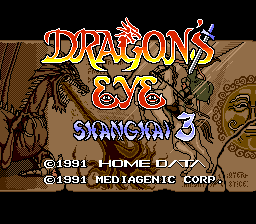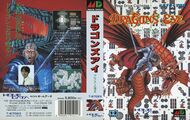Dragon's Eye Plus: Shanghai III
From Sega Retro
| Dragon's Eye Plus: Shanghai III | ||||||||||
|---|---|---|---|---|---|---|---|---|---|---|
| System(s): Sega Mega Drive | ||||||||||
| Publisher: Home Data | ||||||||||
| Developer: Home Data | ||||||||||
| Licensor: Mediagenic Corp. | ||||||||||
| Original system(s): Arcade boards | ||||||||||
| Sound driver: SMPS 68000 | ||||||||||
| Genre: Puzzle[1] | ||||||||||
| Number of players: 1-2 | ||||||||||
| ||||||||||
|
Dragon's Eye Plus: Shanghai III (ドラゴンズアイ プラス 上海III) is a 1991 game by Home Data for the Sega Mega Drive released exclusively in Japan. It is a member of Activision's Shanghai series of mahjong solitaire games — to be precise, it is a port of the Japanese version of what the Western market got as Shanghai II: Dragon's Eye; the numbering discrepancy was because of a Japanese Shanghai II that had already been made. It is one of two games for the Mega Drive produced by Home Data, the other being Shogi no Hoshi.
A slightly expanded port for the PC Engine CD-ROM was made called Battle Shanghai: Dragon's Eye, though it's also known as Shanghai III: Dragon's Eye. The game was designed by a Kenshin Nii (who appears on the back of the game's packaging). The game has two main modes; Shanghai and Dragon's Eye. Shanghai has both a Free and Tournament mode. Dragon's Eye is played against either another human player or the computer. In this mode, player 2/CPU is the Dragon Master, who must fill the playing field (called the Dragon Display) full of tiles to summon a dragon. Player 1 is the Dragon Slayer, who must prevent the summoning by using tiles in their hand to match with the tiles on the board. The Dragon Slayer wins if they destroy the "heart and limbs" of the dragon, which are the four tiles placed in the middle of the Dragon Display when the game starts. The Dragon Slayer can also win if they use all their tiles with space left on the Dragon Display, and still manage to have more points than the Dragon Master.
Activision were not happy with this version of the game, and instead produced their own Shanghai II: Dragon's Eye for the Western market.
Contents
Production Credits
Game's ROM
- Producer: Ken.Nii
- Programmer: Organ
- Graphics: Jin-Nai
- Music: Eurythm
Instruction Manual
- Produce: 児 健興 (Kenshin Nii)
- Program: 小川 貴司 (Takashi Ogawa)
- Graphic: 神内 純弘 (Yoshihiro Jinnai), 清田 みき (Miki Kiyota)
- Music Direction: 遠藤 宏 (Hiroshi Endo)
- Music Compose: 新 嘉彦 (Yoshihiko Atarashi)
- Music Program: 上田 順一 (Junichi Ueda)
Magazine articles
- Main article: Dragon's Eye Plus: Shanghai III/Magazine articles.
Physical scans
| Sega Retro Average | |||||||||||||||||||||||||||||||||||||||||||||||||
|---|---|---|---|---|---|---|---|---|---|---|---|---|---|---|---|---|---|---|---|---|---|---|---|---|---|---|---|---|---|---|---|---|---|---|---|---|---|---|---|---|---|---|---|---|---|---|---|---|---|
|
| 61 | |
|---|---|
| Based on 9 reviews | |
Technical information
- Main article: Dragon's Eye Plus: Shanghai III/Technical information.
References
- ↑ 1.0 1.1 https://sega.jp/history/hard/megadrive/software_l.html (Wayback Machine: 2020-07-02 23:21)
- ↑ File:ShanghaiIII MD JP Box.jpg
- ↑ 1700 igr dlya Sega, "" (RU; 2001-xx-xx), page 267
- ↑ Beep! MegaDrive, "November 1991" (JP; 1991-10-08), page 37
- ↑ Consoles +, "Janvier 1992" (FR; 199x-xx-xx), page 56
- ↑ Famitsu, "1991-11-08" (JP; 1991-10-25), page 38
- ↑ Génération 4, "Janvier 1992" (FR; 199x-xx-xx), page 141
- ↑ Hippon Super, "September 1991" (JP; 1991-08-03), page 91
- ↑ Mega Drive Fan, "January 1992" (JP; 1991-12-07), page 101
- ↑ Sega Saturn Magazine, "September 1995" (JP; 1995-08-08), page 85
- ↑ Video Games, "7/92" (DE; 1992-06-24), page 49
| Dragon's Eye Plus: Shanghai III | |
|---|---|
|
Main page | Comparisons | Magazine articles | Reception | Region coding | Technical information | |
| Shanghai games for Sega systems | |
|---|---|
| Shanghai (1988) | |
| Shanghai II (1990) | |
| Dragon's Eye Plus: Shanghai III (1991) | Shanghai II: Dragon's Eye (1994) | |
| Shanghai: Triple-Threat (1995) | Game no Tetsujin The Shanghai (1995) | Shanghai Great Moments (1996) | |
| Shanghai Dynasty (2000) | |
| Super Shanghai 2005 (2005) | |


